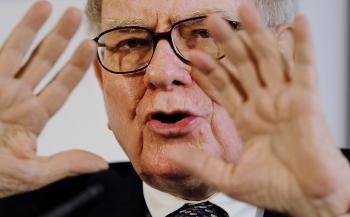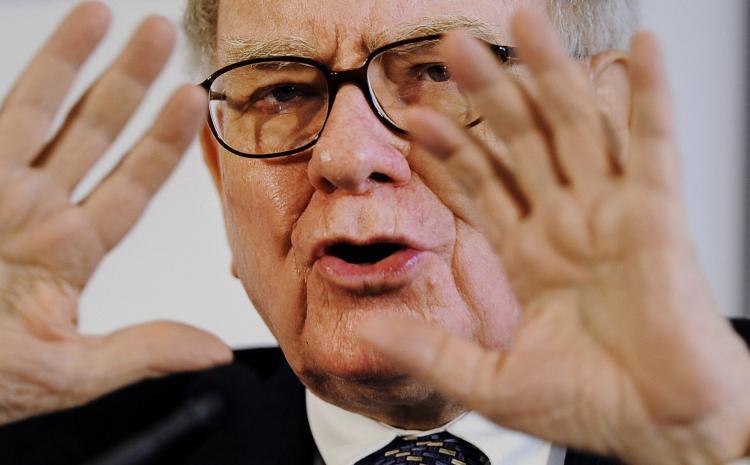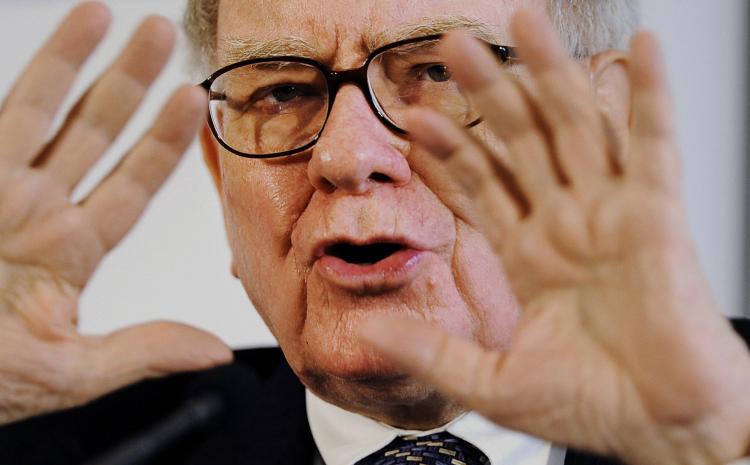Not even the “Oracle of Omaha” could predict the severity of the recent stock market tumble.
Berkshire Hathaway Inc., the holdings company controlled by legendary investor Warren Buffett, announced a 96 percent drop in fourth quarter profit over the weekend.
Last year was easily the worst year on record for Buffett, as Berkshire also saw a 9.6 percent decline in its book value—assets less liabilities—per share, the largest since 1965, when Buffett took over the company.
It was the fifth straight quarter of profit declines at Berkshire. Fourth-quarter net income was $117 million, a far cry from the same period in 2007, when the company earned $2.9 billion.
During the last 40 years, the only other year which Berkshire’s value declined was in 2001 following the dot-com collapse—a decline of over 6 percent.
Poor performance from Berkshire’s several insurance businesses—including General Re and Geico—hurt the company. The stock market decline of late last year also decreased the value of many of Buffett’s stock holdings in companies such as Coca-Cola Co., American Express Co., Wells Fargo & Co., and Benjamin Moore Paints.
Berkshire’s diversified holdings are more or less tied to the overall fluctuations of the market, but the company still handily outperformed the S&P 500 index, which dropped 37 percent in 2008.
“As the year progressed, a series of life-threatening problems within many of the world’s great financial institutions was unveiled,” Buffett wrote in a letter to shareholders on Saturday. “Most of the Berkshire businesses whose results are significantly affected by the economy earned below their potential last year, and that will be true in 2009 as well.”
Buffett also admitted to underestimating the rate of deterioration in the stock market.
“I made some errors of omission, sucking my thumb when new facts came in that should have caused me to re-examine my thinking and promptly take action,” Buffett wrote.
Buffett described one of the errors—ramping up his stock holdings in energy giant ConocoPhillips just as oil prices peaked. Global oil prices have come down significantly over the last several months on fears of demand contraction, dragging energy stocks with them.
But Buffett believes that oil prices would eventually go up as the economy recovers. Without referencing specifics, Buffett pinned hopes on America’s market economy.
“Though the path has not been smooth, our economic system has worked extraordinarily well over time. It has unleashed human potential as no other system has, and it will continue to do so,” he predicted. “America’s best days lie ahead.”
Some analysts agree that should the economy recover, Berkshire is in a great position to reap the rewards.
The company’s role as a provider of liquidity and funding has enabled Buffett to pull off investments that would never be possible in the open market.
As many bond insurers lost their high credit ratings last year, Buffett formed Berkshire Hathaway Assurance to insure municipal bonds.
Last September, Buffett invested $5 billion in perpetual preferred stock of Goldman Sachs Group. While Goldman’s common shares have declined, Buffett’s preferred stock pays 10 percent annual yield, immediately buffering any losses by up to 10 percent.
A month later, Buffett bought $3 billion in preferred shares of General Electric Inc., which also includes a 10 percent annual yield. Berkshire also has similar investment arrangements with a number of other companies.
And during a time when the credit markets are deemed by Buffett to be “nonfunctional,” Berkshire still has more than $24 billion of cash left on hand to spend.
Berkshire Hathaway Inc., the holdings company controlled by legendary investor Warren Buffett, announced a 96 percent drop in fourth quarter profit over the weekend.
Last year was easily the worst year on record for Buffett, as Berkshire also saw a 9.6 percent decline in its book value—assets less liabilities—per share, the largest since 1965, when Buffett took over the company.
It was the fifth straight quarter of profit declines at Berkshire. Fourth-quarter net income was $117 million, a far cry from the same period in 2007, when the company earned $2.9 billion.
During the last 40 years, the only other year which Berkshire’s value declined was in 2001 following the dot-com collapse—a decline of over 6 percent.
Poor performance from Berkshire’s several insurance businesses—including General Re and Geico—hurt the company. The stock market decline of late last year also decreased the value of many of Buffett’s stock holdings in companies such as Coca-Cola Co., American Express Co., Wells Fargo & Co., and Benjamin Moore Paints.
Berkshire’s diversified holdings are more or less tied to the overall fluctuations of the market, but the company still handily outperformed the S&P 500 index, which dropped 37 percent in 2008.
“As the year progressed, a series of life-threatening problems within many of the world’s great financial institutions was unveiled,” Buffett wrote in a letter to shareholders on Saturday. “Most of the Berkshire businesses whose results are significantly affected by the economy earned below their potential last year, and that will be true in 2009 as well.”
Buffett also admitted to underestimating the rate of deterioration in the stock market.
“I made some errors of omission, sucking my thumb when new facts came in that should have caused me to re-examine my thinking and promptly take action,” Buffett wrote.
Buffett described one of the errors—ramping up his stock holdings in energy giant ConocoPhillips just as oil prices peaked. Global oil prices have come down significantly over the last several months on fears of demand contraction, dragging energy stocks with them.
But Buffett believes that oil prices would eventually go up as the economy recovers. Without referencing specifics, Buffett pinned hopes on America’s market economy.
“Though the path has not been smooth, our economic system has worked extraordinarily well over time. It has unleashed human potential as no other system has, and it will continue to do so,” he predicted. “America’s best days lie ahead.”
Some analysts agree that should the economy recover, Berkshire is in a great position to reap the rewards.
The company’s role as a provider of liquidity and funding has enabled Buffett to pull off investments that would never be possible in the open market.
As many bond insurers lost their high credit ratings last year, Buffett formed Berkshire Hathaway Assurance to insure municipal bonds.
Last September, Buffett invested $5 billion in perpetual preferred stock of Goldman Sachs Group. While Goldman’s common shares have declined, Buffett’s preferred stock pays 10 percent annual yield, immediately buffering any losses by up to 10 percent.
A month later, Buffett bought $3 billion in preferred shares of General Electric Inc., which also includes a 10 percent annual yield. Berkshire also has similar investment arrangements with a number of other companies.
And during a time when the credit markets are deemed by Buffett to be “nonfunctional,” Berkshire still has more than $24 billion of cash left on hand to spend.






